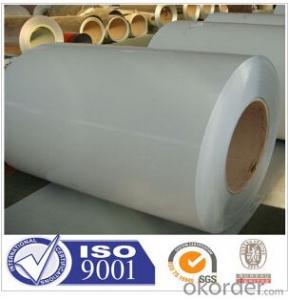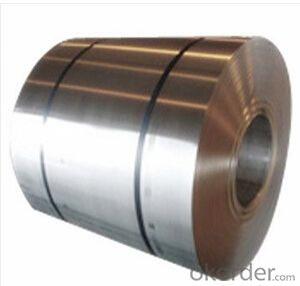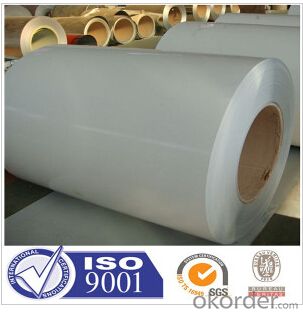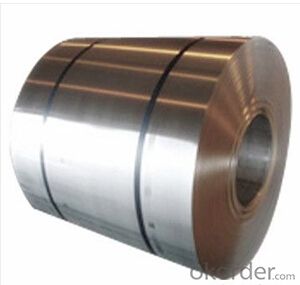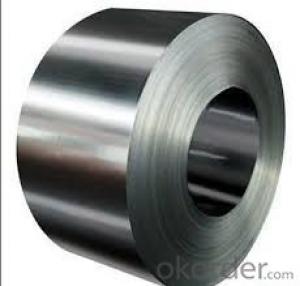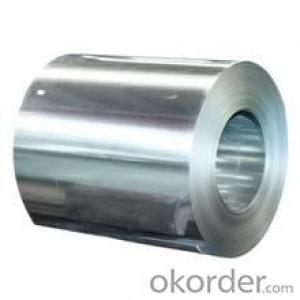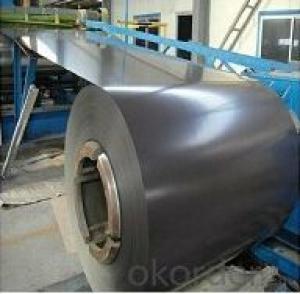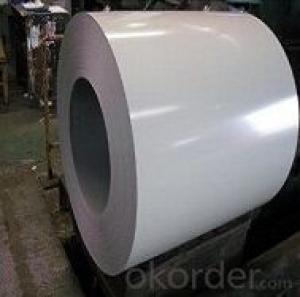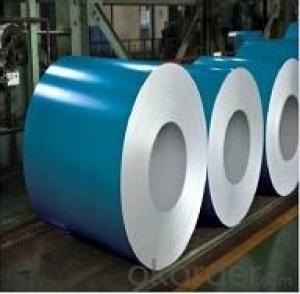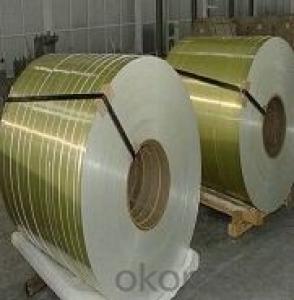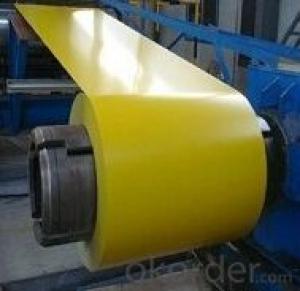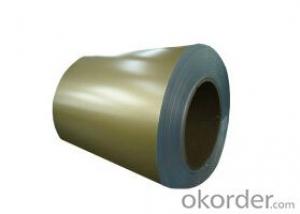0.12mm-1.3mm Prepainted Galvanized Steel Coil
- Loading Port:
- Shanghai
- Payment Terms:
- TT OR LC
- Min Order Qty:
- 25 m.t.
- Supply Capability:
- 10000 m.t./month
OKorder Service Pledge
OKorder Financial Service
You Might Also Like
Basic Info.
Model NO.:MLK-2015157
Surface Treatment:Coated
Certification:ISO, SGS, BV, RoHS, IBR
Technique:Cold Rolled
Standard:ASTM, JIS, GB, AISI, DIN, BS
Application:Construction Material
Edge:Mill
Stock:Stock
Steel Grade:Dx51d, SGCC, Sgch, A653, Dx52D, Dx53D
Place of Origin: China
Width:600mm-1500mm
Thickness:0.13mm-0.8mm
Length:Customered
Delivery Time:15-30 Days
Zinc Coating:30-275G/M2
Top Color Coating:10-25
Bottom Color Coating:7-10
ID:508mm
Export Markets:South America, Eastern Europe, Southeast Asia, Africa, Oceania, Mid East, Eastern Asia
Additional Info.
Trademark:MALIKE OR OEM
Packing:Standard Seaworthy, Export Packing
Standard:AISI, ASTM, BS, DIN, GB, JIS
Origin:Shandong, China
HS Code:7210700000
Production Capacity:700mt/Day
| NAME | GALVANIZED | GALVALUME/ALUZINC | PPGI/PPGL |
| MODEL NO. | (0.13-1.2)mm*(600-1250)mm | ||
| TYPE | steel coil, steel sheets/ plates, corrugated steel sheets/plates | ||
| TECHNIQUE | Hot rolled-cold rolled-galvanized | hot rolled-coldrolled-galvalume /Aluzinc | Hot rolled-cold rolled--galvalume/galvanized - PPGL/PPGI |
| SURFACE TREATMENT | Mini/regular/ big/zero spangle, ,Chromate treatment/ chromate-free treatment/ untreated Unoile/ oiled ,TENSION LEVELLERT SKIN PASS anti-fingerprint/Un-anti-fingerprint, coating | Polyester(PE),Silicone Modified(SMP),Acrylic (AC), Polyurethane(PU)PVC Plastisol(PVC plastisol can be embossed to versatile texture)etc | |
| APPLICATION | Guardrails, ventilation ducts, gutters and down spouts, Pre-paint and post paint applications, gutters and down spouts, ceiling suspension bars, shutter door rails. Auto parts, electrical appliances, refrigerator appliances, signs, automotive parts,vending machines, washing machines, showcases and other structural use, roofing, commercial use | Gutters, auto parts, electrical appliances, vending machines, refrigerators, ovens, for pre-paint. structural use, roofing, commercial use etc | Electrical appliances, roofing, partitions. Factory buildings, elevator panelsetc Special applications: wear resistant steel, high-strength-steel plate |
- Q: I just got this aftermarket exhaust on my truck and it's recommended that it be welded, but the metal is aluminized steel. How do I mig weld aluminized steel?
- aluminized steel is just std steel with a coating applied to it to keep it from rusting. It welds just like std mild steel. You need to prep the joint and thats it. Use a wire wheel, brush, sandpaper or what ever to clean the joint of the pipes where you will weld. You don't have to get too crazy here. Just a quick brush/wipe with sand paper over the joint and your ready to weld. For mig welding, I would use a 75/25 gas mix, .023 or .030 solid steel wire, around 50-70 amp setting (on most migs this will be #2 heat setting) and around 3/10th to 4/10th wire speed. (some welders will list 0-10, others 0-100, so figure your scale, like 0-10 it would be 3-4, one that list it by 10's then it would be 30-40)
- Q: I'm getting new strings on my dad's old acoustic guitar so I can learn how to play it and I'm wondering if I should get nylon or steel strings. Are there any major differences between the two aside from the nylon strings being easier on your fingers? Like do the Nylon strings sound different?
- Steel strings sound much better as in brightness and tone. Nylon strings sound dull and don't hold tune well but are easier to press. You need to build calouses on your finger tips and using steel will do this, just take it easy until they form and stop when they start hurting moderately. When you put new strings on a guitar, it's very good to break them in by pulling on them from the neck upwards to stretch them out. If you don't, you will need to tune them much until they wear themselves in. Good luck and make some sweet music !!
- Q: I should have known, but magnets don't stick to stainless steel, so now I'm at a loss, I can't display my photos on the fridge. any ideas?
- I am a designer and have had to work with this issue in families where children's artwork is proudly displayed. You can frame a piece of sheet metal and hang on a wall in the kitchen. The website had step-by-step instructions:
- Q: What are the quality standards for steel coil manufacturing?
- The quality standards for steel coil manufacturing typically include factors such as dimensional accuracy, surface finish, mechanical properties, chemical composition, and adherence to industry-specific standards set by organizations like ASTM or ISO.
- Q: What is stainless steel coil used for?
- Stainless steel coil is commonly used in various industries for manufacturing a wide range of products such as appliances, automotive parts, cookware, construction materials, and even surgical instruments. Its corrosion-resistant properties and durability make it an ideal material for these applications.
- Q: Can steel coils be coated with anti-slip materials?
- Yes, steel coils can be coated with anti-slip materials. These materials can provide additional friction and grip to prevent slipping and sliding during transportation or handling.
- Q: I just purchased this Benchmade knife with m390 steel blade and it cost me a fortune but I wanted to know if this new steel is a tool steel. what classifies a tool steel. M390 = 1.9 carbon, 20. chromium, .30 manganese, 1. molybdenum, .60silicon, .60 tugsten, 4. vanadium at 60-62 HRC
- Which has better songs - Number Of the Beast Which has better riffs - British Steel Which has better solos - Number of The Beast Which has better vocals - Number of the Beast Which has a cooler cover - Number of the Beast Which do You prefer - This is a real thinker, almost like Sophies Choice Metal edition. But I have owned Number and the Beast longer than I have owned British Steel. So I go with Iron Maiden Both albums get a perfect 10 because they deserve it, both have great musicianship and both have great vocals
- Q: Can you suggest me names of sites which aids in construction of Pre Fabricated Steel Buildings.
- I okorder /... NCI produces many brand name buildings. Kirby Pasco If you get technical with your question I probably can help you. I have sold many millions of dollars worth of them. Depending on the manufacturer the directions are usually easy to follow. The only suggestion I have is avoid the brokers. Try and deal directly with the manufacturer. The construction plans are usually specific to your building not generic plans like some brokers have.
- Q: What are the dimensions of steel coils used in the furniture industry?
- The dimensions of steel coils used in the furniture industry can vary, but common sizes range from 0.5 to 3 millimeters in thickness and 100 to 2000 millimeters in width. The length can be customized based on specific furniture manufacturing requirements.
- Q: i have a computer chair where the metal part that attachs the top part to the bottom with wheels has cracked around half of the assembly. my dad said it might be able to be repaired with jb weld. can jb weld fix it? how strong is jb weld? is it as strong as steel?
- ...
Send your message to us
0.12mm-1.3mm Prepainted Galvanized Steel Coil
- Loading Port:
- Shanghai
- Payment Terms:
- TT OR LC
- Min Order Qty:
- 25 m.t.
- Supply Capability:
- 10000 m.t./month
OKorder Service Pledge
OKorder Financial Service
Similar products
Hot products
Hot Searches
Related keywords
